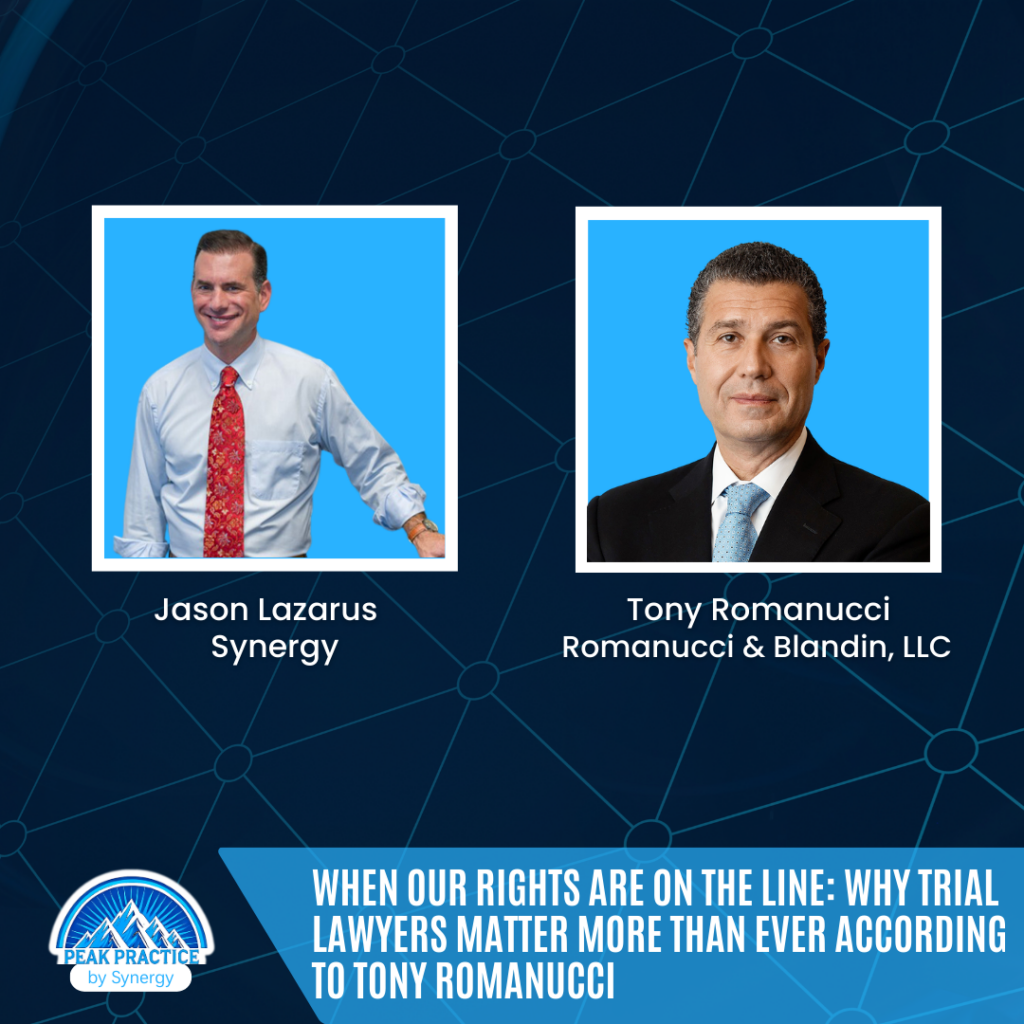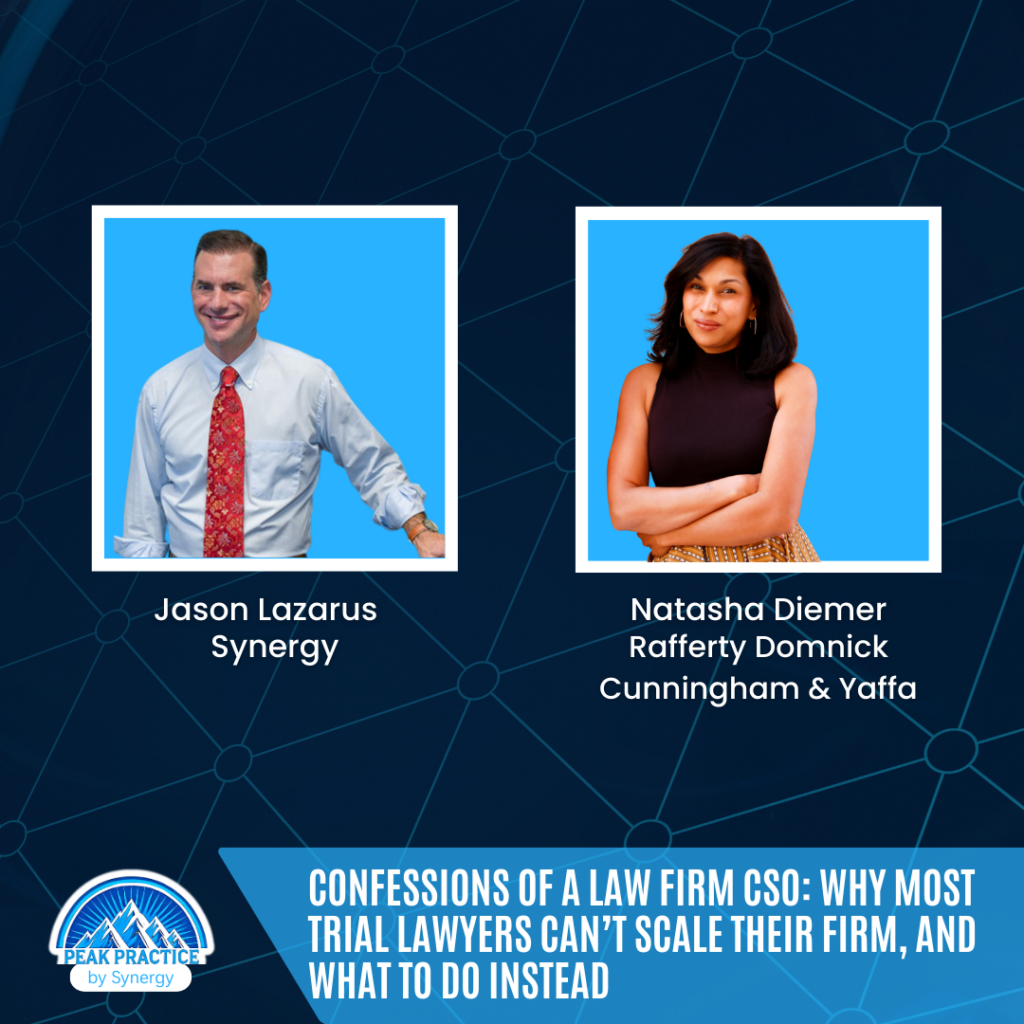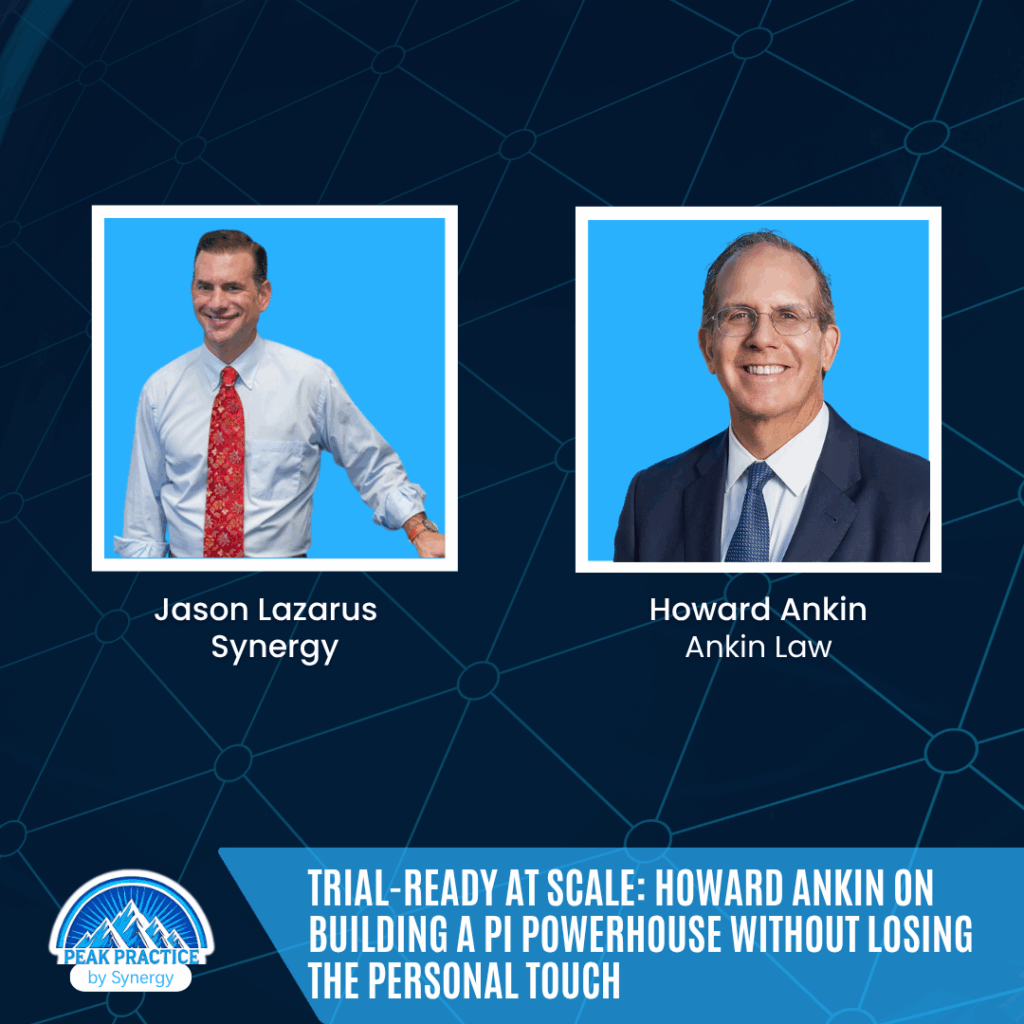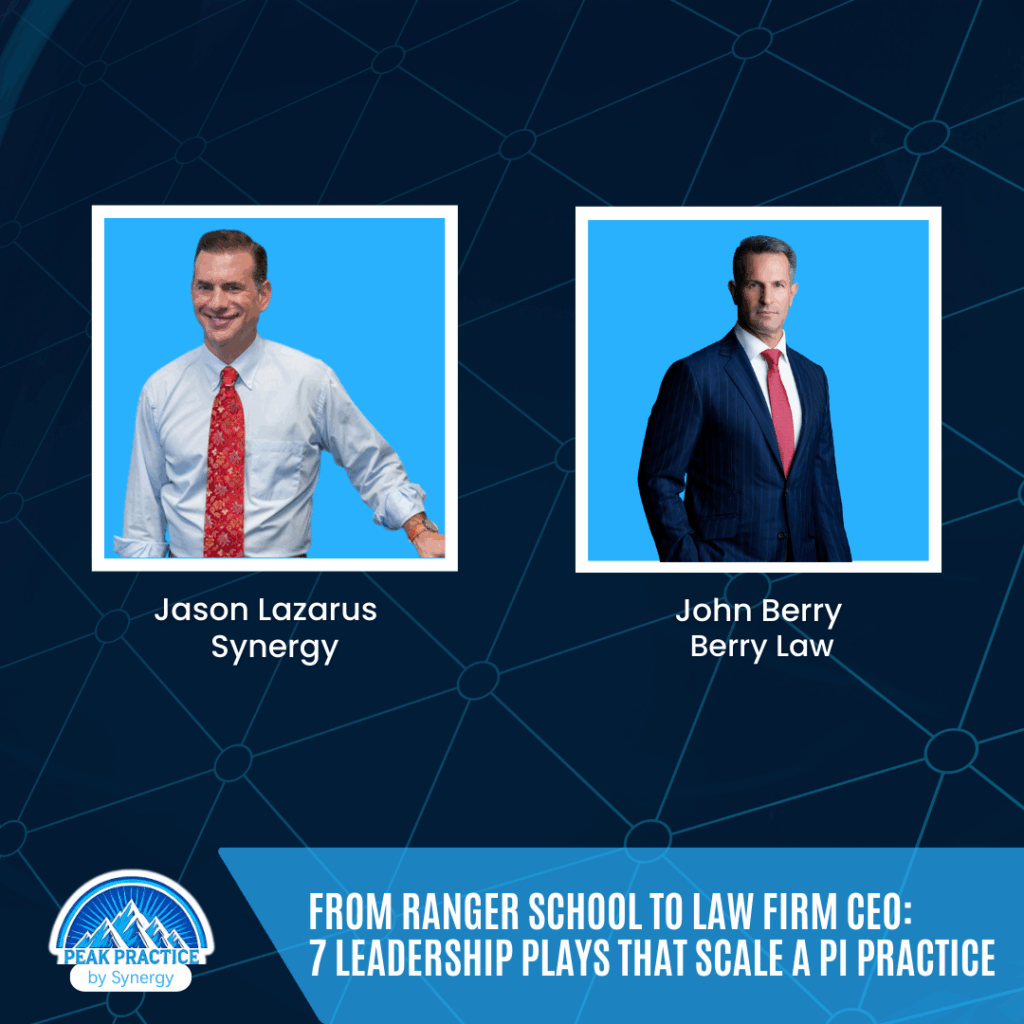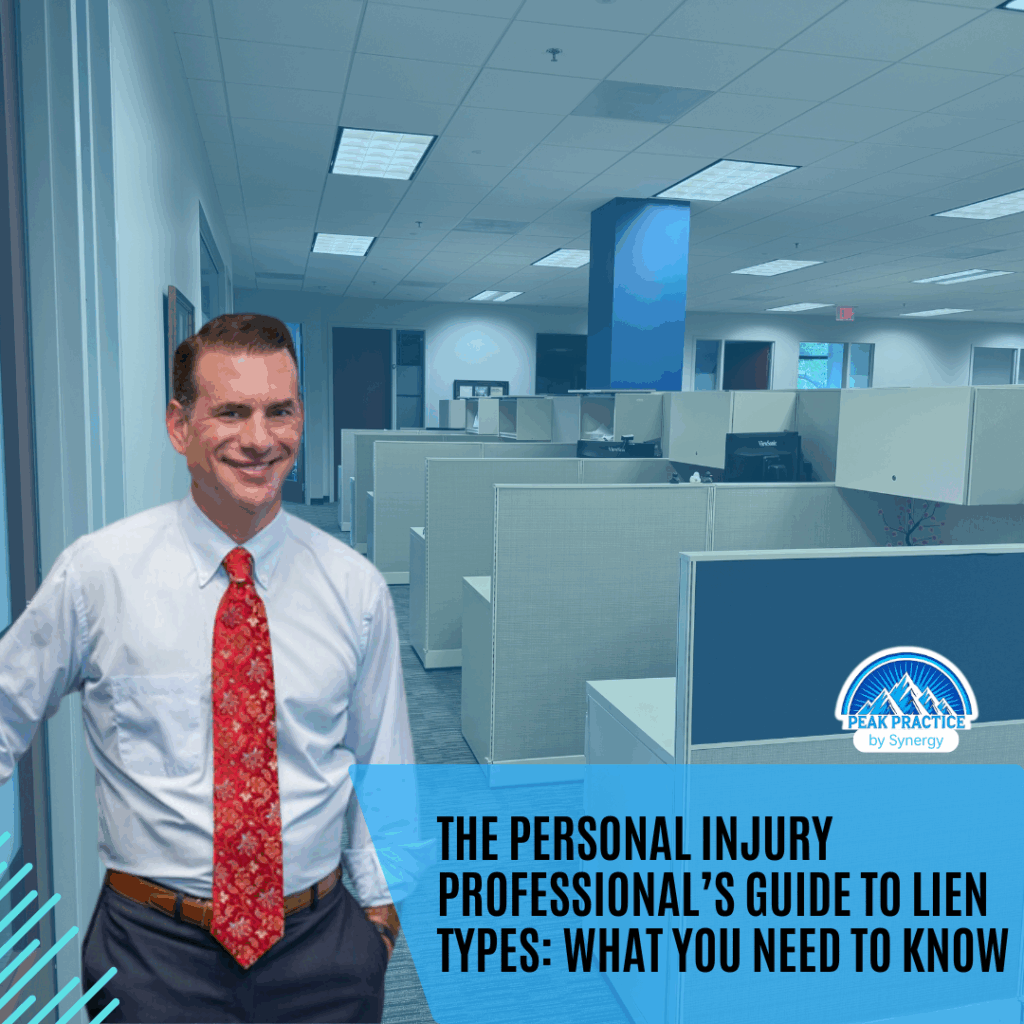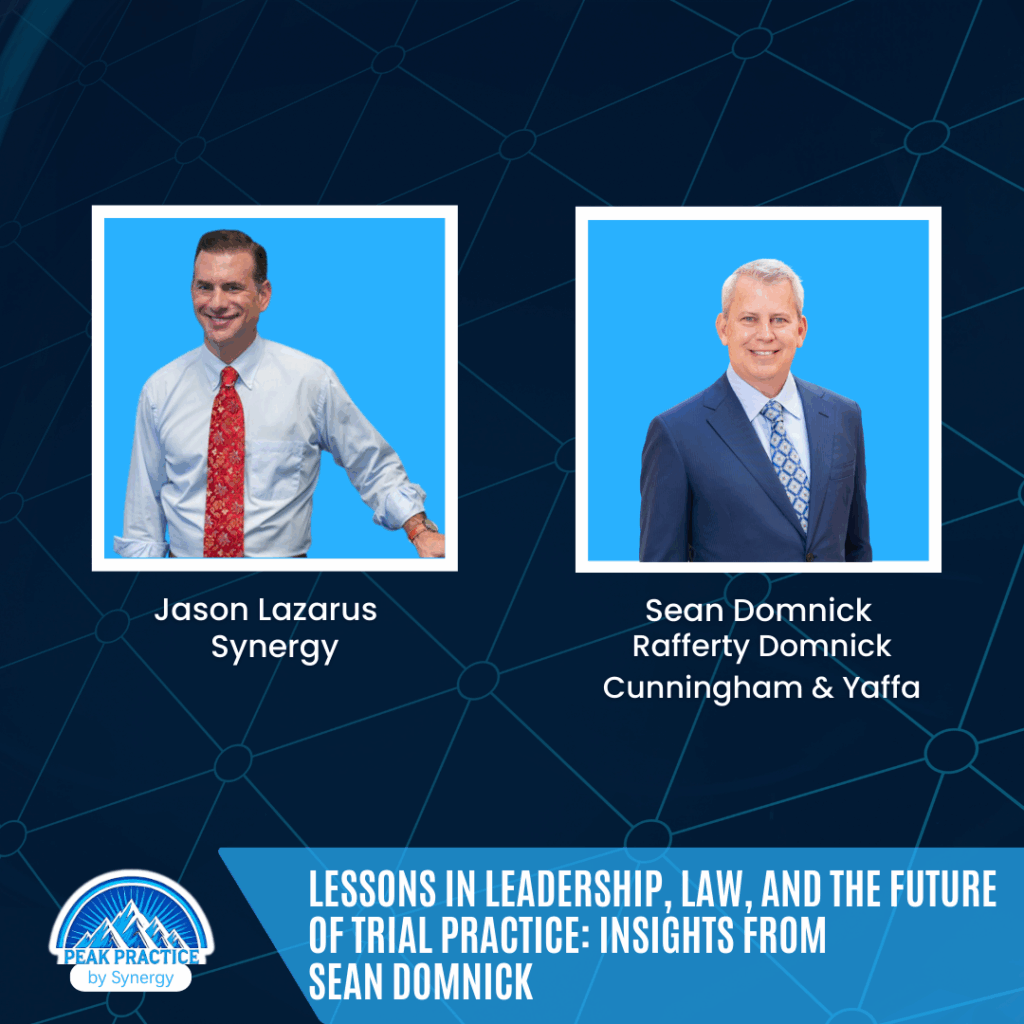PEAK PRACTICE
Peak Practice is a community that delivers expert industry insights on how to scale, streamline, and accelerate personal injury law practices. By providing knowledge and resources on law firm operations, marketing, and business growth, Peak helps personal injury attorneys gain a competitive edge. As the leader in lien resolution, Synergy partners with firms to eliminate settlement bottlenecks, optimize client outcomes, and drive greater profitability—so you can focus on securing justice. Join the community here and discover how partnering with Synergy helps you achieve Peak Practice.
Below are our Synergy InSights on all things related to Peak Practice.
On a recent episode of the Trial Lawyer View by Synergy podcast, I sat down with Antonio Romanucci of Romanucci & Blandin, LLC, one of the country’s most respected civil rights trial lawyers, to talk about something that should have every trial lawyer paying attention. Not just because it affects clients, but because it affects the very role lawyers play in a functioning democracy.
Tony did not mince words. He described the current wave of executive orders targeting diversity initiatives, policing practices, and the legal profession itself as “diabolical.” Strong language, yes. But after listening closely, it is hard to dismiss the concern.
Three Pressure Points Trial Lawyers Cannot Ignore
Tony framed the current environment around three interconnected threats.
First, the elimination of diversity. Not as a buzzword, not as a talking point, but as a rollback of hard-fought progress that allowed different lived experiences to shape education, workplaces, and institutions. When diversity is stripped away, so is perspective. And perspective is what keeps systems honest.
Second, the aggressive expansion of policing power. Tony explained how marginalized communities bear the brunt of unconstitutional policing, and how recent rhetoric and recruitment efforts have emboldened behavior that years of reform work tried to correct. His warning was clear. Aggressive policing almost always leads to civil rights violations.
Third, and this one should hit close to home, the direct attack on lawyers. When the ability of attorneys to choose clients, challenge power, or pursue accountability is weakened, the entire justice system tilts. Tony reminded us of an old truth. If you want to eliminate accountability, you start by silencing the lawyers.
Lawyers as Guardians, Not Spectators
One of the most powerful moments in the conversation came when Tony described lawyers as guardians of democracy. Not in a poetic sense, but in a very real, functional way.
People can speak out. But without lawyers willing to file lawsuits, challenge unconstitutional acts, and absorb the personal and professional pressure that comes with doing so, none of it matters.
This is where trial lawyers, especially those on the private side, play a critical role. Civil rights litigation. Police misconduct cases. Institutional accountability. These are not side projects. They are important work. Just like personal injury!
And as Tony pointed out, we are seeing a familiar pattern. After George Floyd’s murder, reforms moved forward. Consent decrees were put in place. Policing standards tightened. Then, slowly, much of that progress began to unravel.
“One step forward, two steps back,” he said.
Why This Conversation Belongs in a Growth-Oriented Community
You might be wondering why a discussion like this belongs in a community focused on scaling practices, improving operations, and building better firms.
Here is why. The most successful trial lawyers do not separate growth from responsibility. They understand that leadership extends beyond the balance sheet. Firms that scale with intention do so because they know who they are, what they stand for, and why their work matters.
Innovation is not just about systems and processes. It is about courage. It is about deciding when to lean in, even when the work is hard, unpopular, or risky.
The Bigger Takeaway
This episode was not about politics. It was about power, accountability, and the role trial lawyers play when institutions are under strain.
Peak Practice commentators talk a lot about building firms that last. That requires more than operational excellence. It requires clarity of purpose.
If you believe the law is a tool for justice, not convenience, then conversations like this are not optional. They are essential.
🎧 Listen to the full podcast conversation on Trial Lawyer View here: https://triallawyerview.com/podcast/antonio-m-romanucci-2nd-appearance/
🔗 Want more insights like this?
If you’re a personal injury lawyer ready to scale, streamline, and step into your role as CEO, let’s talk. Join the Peak Practice Community, and learn how synergy. can help you eliminate settlement bottlenecks, resolve complex liens, and maximize recoveries. Learn more here: https://partnerwithsynergy.com/peak-practice/
If you want to grow and scale your law firm more effectively, consider partnering with Synergy for lien resolution. Learn more at: https://partnerwithsynergy.com/liens/
Can you be a courtroom warrior and run a high-performing business? For most personal injury trial lawyers, the answer is: not without help.
In a recent episode of the Trial Lawyer View by Synergy podcast, I sat down with Natasha Diemer, Chief Strategy Officer at Rafferty Domnick Cunningham & Yaffa (RDCY), a nationally recognized PI firm building serious momentum. Our conversation pulled back the curtain on how law firms can grow strategically without burning out their top lawyers or compromising client results. Here’s what every trial lawyer should take away from our discussion.
🎯 The Role Most Firms Still Don’t Have But Desperately Need
Natasha made it clear: great lawyers don’t automatically make great CEOs. Yet many trial firms still expect their top litigators to double as business leaders. It’s a recipe for stalled growth and operational chaos. The game-changer at RDCY? A dedicated leadership role focused solely on strategy.
“You’ve got to know what you don’t know. Not everybody has a John Morgan running their business,” Natasha shared. “You need someone focused on growth, team structure, and operational change”.
Having a CSO or COO, even a fractional one, can help manage the business side, freeing up trial lawyers to focus where they’re strongest: in the courtroom.
🔧 Operational Gaps That Kill Momentum
If you’re hiring more staff but not seeing better results, Natasha would tell you to look at your onboarding and training systems.
“We bring in help but don’t invest in setting them up for success,” she said. “Most roadblocks happen when someone isn’t trained to meet the real needs of the trial team”.
It’s not just about filling roles, it’s about building capability. And that includes:
- Cross-training staff
- Customizing workflows for each legal team
- Creating feedback loops to address inefficiencies early
The firms that scale are the ones that invest in human capital, not just headcount.
🧠 Tech Overwhelm is Real. Here’s How to Cut Through the Noise
With every legal conference showcasing dozens of new tools, Natasha offered a candid reality check:
“There used to be four case management software options, now there are 400. Everyone’s promising a magic solution”.
RDCY formed an internal AI and tech committee to carefully vet tools based on their actual needs, not marketing hype. Her advice?
✅ Survey your staff on repetitive tasks
✅ Focus on solving real problems, not chasing trends
✅ Be selective. One good tool is better than five unused ones
🧭 Strategy Starts with Knowing Your Priorities
The hard part for most firms isn’t choosing the right software or partner. It’s choosing what matters now.
“You can be a four-person firm or a national boutique, either way, you have to ask: What’s the one thing we’ll do better this year?”
It’s not about doing everything. It’s about doing the right things in the right order, guided by clear goals and intentional leadership.
💡 Branding That Actually Reflects Your Values
Natasha also touched on how RDCY approaches branding, not with canned marketing tactics, but with purpose.
They partnered with a marketing team that adapted to their vision, instead of pushing a cookie-cutter campaign.
“It has to feel like your firm. You can’t fake authenticity. You need a partner that’s delivering your story, not fitting you into a template”.
This kind of brand clarity isn’t just for visibility, it drives trust, differentiation, and team alignment.
🌄 Why This Matters to the Peak Practice Community
Natasha’s insights matter to Peak Practice because they spotlight a critical truth: personal injury law firms can’t scale on trial talent alone. Her leadership at RDCY shows what’s possible when firms invest in operational strategy, build strong internal systems, and align technology decisions with real needs, not trends. She reminds us that law firm growth starts with clarity, not complexity.
🎧 Listen to the full podcast conversation on Trial Lawyer View here: https://triallawyerview.com/podcast/natasha-diemer/
🔗 Want more insights like this?
If you’re a personal injury lawyer ready to scale, streamline, and step into your role as CEO, let’s talk. Join the Peak Practice Community, and learn how Synergy can help you eliminate settlement bottlenecks, resolve complex liens, and maximize recoveries. Learn more here: https://partnerwithsynergy.com/peak-practice/
If you want to grow and scale your law firm more effectively, consider partnering with Synergy for lien resolution. Learn more at: https://partnerwithsynergy.com/liens/
If you want a snapshot of where personal injury practice is headed, look at what it takes to win jury trials with Ankin Law. In Howard Ankin’s shop, that means a real budget for focus groups, purpose-built visuals for every phase, and specialists whose only job is to make the story land for jurors.
In our conversation on Trial Lawyer View by Synergy podcast, we dug into how he built a high-volume personal injury and workers’ compensation firm while keeping a culture that treats clients like family. For innovative trial lawyers who want to grow without giving up craftsmanship, this playbook matters.
🔎 Why scale now
Ankin didn’t scale because of a grand plan. He scaled because the market forced the issue. The 2008 downturn pushed him to build infrastructure that could survive shocks. The next wave came as private equity and national PI brands expanded into local markets. With alternative business structures taking root in places like Arizona and Utah, he sees a future where massive, well-capitalized firms compete in every channel. Capacity and systems are no longer optional. The firms you face tomorrow will have capital, media, and intake engines. Your edge becomes operational excellence paired with an authentic client experience.
🧱 Infrastructure is the hidden advantage
Infrastructure is the quiet driver of outcomes. Ankin describes a constant arms race to integrate the many tools it now takes to run a case from intake to verdict. Nothing arrives in a box that just works. Each tool adds monthly cost and complexity, so the only sane way to decide what to keep is to map the tech stack to the case lifecycle. If a system removes delays between intake, demand, filing, discovery, mediation, and trial, it stays. If it creates friction, it goes. The goal is a stack that helps lawyers do the high-value work while the technology handles the routine.
⚖️ Trial-readiness is a process
Trial-readiness has become a process, not a promise. In Ankin’s firm, every case is focus grouped before trial. Dedicated team members build exhibits so visual communication strengthens oral advocacy. Jurors live on screens and absorb information in snapshots, so demonstratives are not a luxury. Treat focus groups and visuals as baseline case costs. If you do not have an internal exhibit lab, build predictable partnerships so you can move quickly the moment a setting gets real.
🤝 Keep it personal on purpose
Through all the growth, Ankin keeps the work personal by design. His ethos was forged in a family practice where clients called his father’s house. Today, “injury law made personal” means more on-site staff than many competitors and no offshore answering services or paralegal teams. Most of the team works in-office because attention and accountability improve when people share space. If you want clients to feel cared for, define what personal actually looks like at scale. Then hire, train, and measure against those behaviors so the promise shows up in every call, text, and meeting.
🧠 Buy expertise before you need it
Quality control is about buying the right expertise at the right time. Maximizing recovery often turns on spotting the third-path claim and pairing it with a targeted expert. That takes a real budget for consultation fees and, in some cases, a standing relationship with a consultant who can source niche experts on short notice. Build your expert bench early, not after a lowball offer arrives. Treat expert discovery like any other critical path task with timelines, owners, and funding.
🚀 What to do this week
If you want practical next steps, start by auditing your tech stack against the case timeline and cut what does not shorten the distance from intake to resolution. Institutionalize focus groups with clear criteria and calendar them like depositions. Codify your client experience in a short list of observable behaviors and train them until they become muscle memory. Above all, commit to a definition of trial-ready at scale that your entire team understands, from intake specialists to first-chair trial lawyers.
🌄 Why This Matters to the Peak Practice Community
Howard Ankin’s model matters to Peak Practice because it proves you can build real capacity without sacrificing the human touch. His focus on trial-readiness, visual storytelling, and disciplined expert work shows how process and craftsmanship can live side by side. By defining “personal” at scale and funding the tools that move cases faster and smarter, he sets a path for firms that want growth with integrity. This aligns with Peak’s mission to help PI leaders build durable systems, while synergy. removes friction through lien resolution so your team can stay focused on advocacy, outcomes, and long-term client trust.
🎧 Listen to the full podcast conversation on Trial Lawyer View here: https://triallawyerview.com/podcast/howard-ankin/
🔗 Want more insights like this?
If you’re a personal injury lawyer ready to scale, streamline, and step into your role as CEO, let’s talk. Join the Peak Practice Community, and learn how synergy. can help you eliminate settlement bottlenecks, resolve complex liens, and maximize recoveries. Learn more here: https://partnerwithsynergy.com/peak-practice/
If you want to grow and scale your law firm more effectively, consider partnering with Synergy for lien resolution. Learn more at: https://partnerwithsynergy.com/liens/
When John S. Berry and I sat down for Trial Lawyer View, one moment hit me like a flash grenade: “As of last Friday, Berry Law has about 187 employees in 12 states.” That kind of growth doesn’t happen by accident. It happens because a leader owns the vision, builds the right infrastructure, and keeps lawyers focused on what actually moves cases and clients forward.
John’s journey from Ranger School to running a national veterans and injury firm offers a practical playbook for any trial lawyer who wants to grow without losing the soul of the practice. Here are seven leadership moves you can steal today.
🎯 Own the vision
In the old partner-driven model, everyone has a say and no one has a clear picture. John’s take is simple: one leader has to visualize the whole “battlefield,” see the obstacles, and align the team around a single direction. Otherwise, you’re staring at half the beach ball and missing what’s on the other side.
🏗️ Build “battalion” infrastructure
John organized his firm like an infantry battalion: dedicated leads for sales, marketing, IT, operations, finance, and HR whose job is to support the lawyers. That structure keeps legal strategy with the lawyers while specialists run the business functions at a high level.
⚖️ Keep lawyers in the strategy seat
“Officers plan and NCOs execute.” That military truth maps cleanly to plaintiff work. Senior trial lawyers set the strategy and carry the burden for the case; talented staff and associates execute so the lead lawyer doesn’t get lost in the weeds. When lawyers try to do everything, they miss the big picture that wins trials and drives results.
🏁 Decide faster than the next firm
Indecision kills momentum. John told a story about a 30-lawyer firm that spent six months arguing over carpet color while growth stalled. Leaders who make timely calls, even on small stuff, keep the organization focused on the mission, not the blinds.
🪖 Prepare like a Ranger, adapt like a CEO
Berry Law already had remote leadership muscle before COVID. When the world shifted, they had an “op plan” and moved the team remote overnight. That readiness mindset lets you respond fast and keep serving clients when conditions change.
📊 Measure what matters
Plenty of firms still skip the basics: KPIs, regular reviews, data-driven decisions. If you can’t see workload, utilization, and cash flow in near real time, you’re flying blind. That’s not a business; it’s a hope.
📈 Put results over reputation
This one’s worth taping to your monitor: “Don’t worry about your reputation, worry about your results.” Do right by the client, teach your team to do the same, and reputation follows. That’s how you grow sustainably in PI.
🧘♂️⚖️ Courtroom bonus: Presence beats bravado
The best trial lawyers aren’t loud; they’re locked in. John calls it “situational awareness.” Be the most prepared, most credible person in the room. Stay flexible because the story can shift in an instant. Preparation is the path to poise.
Quick wins you can implement this quarter
- Name your vision owner. If it’s you, say it out loud. If it’s not, pick them. Then document the next 3 firm priorities.
- Stand up a battalion-style org. Assign accountable leads for marketing, intake/sales, ops, finance, IT, and HR. Their job is serving the lawyers.
- Unburden your trial lawyers. Push non-lawyer tasks to trained staff. Keep your best lawyers on strategy, relationships, and high-value advocacy.
- Codify an “op plan” for disruption. If you had to go remote again tomorrow, what happens in 24 hours? Write it. Test it.
- Publish and review KPIs monthly. Intake-to-sign rates, cycle times, case value velocity, AR days. If it impacts clients, measure it.
- Coach presence. Trial skills training that prioritizes awareness and preparation beats “winging it” every time.
🌄 Why This Matters to the Peak Practice Community
John’s philosophies matter to the Peak Practice community because they translate growth into a disciplined, client-first operating system. A single owner of the vision, a battalion-style structure that supports lawyers, and a results-over-reputation mindset give firms clarity on who does what and why it matters. His focus on preparation, fast decision-making, and measurable KPIs helps trial teams keep their edge in the courtroom while the business runs with purpose. That approach aligns with Peak’s mission to help innovative PI firms scale, sharpen operations, and invest their time where it counts most. It also pairs naturally with Synergy’s role in removing lien and settlement bottlenecks so leaders can stay in the strategy seat. For attorneys who want to grow without losing their core, John’s playbook is a practical roadmap for building a durable, high-trust practice.
🎧 Listen to the full podcast conversation on Trial Lawyer View here: https://triallawyerview.com/podcast/john-berry/
🔗 Want more insights like this?
If you’re a personal injury lawyer ready to scale, streamline, and step into your role as CEO, let’s talk. Join the Peak Practice Community, and learn how Synergy can help you eliminate settlement bottlenecks, resolve complex liens, and maximize recoveries. Learn more here: https://partnerwithsynergy.com/peak-practice/
If you want to grow and scale your law firm more effectively, consider partnering with Synergy for lien resolution. Learn more at: https://partnerwithsynergy.com/liens/
In the high-stakes world of personal injury litigation, one word can quietly threaten your client’s net recovery and your firm’s efficiency: liens.
From government agencies to private insurers, everyone wants a piece of your client’s recovery. But not all liens are created equal. And if you don’t understand how to identify, analyze, and resolve them, you could cost your client thousands or expose your firm to malpractice risk.
In this Peak Practice Newsletter, we’re breaking down the essential lien types every legal professional should know. But first, let’s tackle the threshold issue of whether you are dealing with a lien, subrogation, reimbursement or just a debt.
🔍 Is it a lien, subrogation, reimbursement rights or just a debt?
In personal injury cases, a lien gives a health insurance plan or a hospital the ability to get paid from a personal injury recovery. A lien is different from a simple debt. A debt means someone is owed money, but a lien means they have a legal claim to specific funds, like the personal injury settlement.
There are also other types of claims that could be asserted. Subrogation arises when an insurance company steps into the shoes of your client and claims the right to recover from the person who caused the injury. Reimbursement rights, sometimes called an “equitable lien by agreement,” are based on a contract with a health insurance plan.
Understanding these differences matters. Not every claim to your client’s settlement is enforceable like a perfected lien and knowing the difference can help you protect your client’s bottom line. If there is a lien or reimbursement right, here is some basic guidance and explanation about the most frequently encountered types in a personal injury settlement.
⚖️ The 7 Major Types of Health Insurance Liens/Reimbursement Claims You Are Likely to Encounter
1. Medicare (Parts A & B) Conditional Payments
These arise when Medicare pays for injury-related care before settlement. Under the Medicare Secondary Payer Act, Medicare must be reimbursed. The resolution process is tedious and unforgiving.
👉 Why it matters: Failure to pay Medicare’s final demand within 60 days can result in unwanted government action and personal liability for the attorney.
2. Medicare Advantage (Part C) Liens
These are administered by private insurers and often are missed or overlooked. Unlike traditional Medicare, they don’t always follow transparent government protocols. Private recovery vendors like Rawlings or Optum aggressively pursues these claims.
👉 Pro tip: These must be resolved separately from traditional Medicare Conditional Payments. Don’t confuse the two. And be aware that if you miss one, Medicare Advantage plans have become quite aggressive in trying to recover double the lien amount under the MSP double damages provision.
3. Medicaid Liens
State-run Medicaid programs assert liens based on their own rules. The variability can be dizzying as what applies in Florida doesn’t in California.
👉 Why it’s risky: Failing to follow state-specific procedures can derail disbursement and violate statutory requirements. Remember though, Ahlborn (US Supreme Court decision) does provide a reduction formula that can be argued in nearly every state.
4. ERISA Liens
Employer-sponsored health plans, especially self-funded ERISA plans, are powerful lienholders. Thanks to SCOTUS rulings like Sereboff and McCutchen, plan language rules the day.
👉 Red flag: If the plan disclaims the “made whole” and “common fund” doctrines, equitable defenses may be lost. But there are typically leverage points that can be used to try and secure a reduction.
5. FEHBA and Military Liens
Federal employee and military health plans, including TRICARE, assert liens under federal statutes. They’re often strict, opaque, and slow to compromise.
👉 Pro insight: You must negotiate with federal recovery contractors directly, timing and communication are key.
6. Private Health Insurance / Subrogation Claims
These range from group plans to fully insured policies. Resolution depends on policy language and, often, the aggressiveness of recovery vendors.
👉 Strategy tip: Always request plan documents and scrutinize for enforceability under applicable state law.
7. Hospital and Provider Liens
Hospitals may file statutory liens for unpaid bills. These are often inflated and must be scrutinized for reasonable value of services, not full billed charges.
👉 Avoid this pitfall: Failing to reduce to reasonable cost can be very costly for your client.
🧠 Why Personal Injury Professionals Must Understand the Various Lien Types
Each lien type comes with its own procedural landmines. Missteps can:
- Delay case closure
- Jeopardize your client’s recovery
- Trigger personal liability
- Lead to malpractice exposure
Understanding lien nuances isn’t optional, it’s a professional obligation. It’s also an opportunity: effective lien resolution can maximize your client’s net and enhance your firm’s Google reviews.
🔧 What Can You Do?
If this feels overwhelming, you’re not alone. Synergy has spent decades helping firms like yours ethically and efficiently resolve complex lien issues. Our team knows the playbook recovery contractors use and how to beat them at their own game.
🔗 Want more insights like this?
If you’re a personal injury lawyer ready to scale, streamline, and move your practice forward exponentially, let’s talk. Join the Peak Practice Community, and learn how synergy. can help you eliminate settlement bottlenecks, resolve complex liens, and maximize recoveries. Learn more here: https://partnerwithsynergy.com/peak-practice/
If you want to grow and scale your law firm more effectively, consider partnering with Synergy for lien resolution. Learn more at: https://partnerwithsynergy.com/liens/
What does it take to lead trial lawyers across the country, balance the demands of a very busy medical mal practice, and confront emerging challenges like artificial intelligence and attacks on the rule of law?
In a recent episode of the Trial Lawyer View by Synergy podcast, I sat down with Sean Domnick of Rafferty Domnick Cunningham & Yaffa, past president of the American Association for Justice (AAJ) and one of the nation’s most respected trial lawyers, for a conversation that every attorney focused on growth and impact should hear.
🤝👥The Power of Relationships in Leadership
When Sean reflected on his time as AAJ president, one theme stood out: relationships. He described how trial lawyers, despite differing opinions, rallied around the importance of being heard and respected. The lesson applies as much inside a law firm as it does in the courtroom: the ability to build consensus, unify strong personalities, and move in one direction is what defines real leadership.
As Sean put it, trial work isn’t just about winning one case, it’s about cases that become causes, transforming single outcomes into broader change. For firms seeking to scale, that same mindset of turning challenges into opportunities for lasting impact is essential.
⚖️🤖Confronting Today’s Challenges: AI and the Rule of Law
We also tackled issues shaping the future of the profession. Sean emphasized that artificial intelligence is no longer a distant concept; it’s here. The AAJ even created a special committee to explore how AI can support practices while safeguarding against risks.
Equally pressing is the erosion of the rule of law. From judicial independence to the enforcement of rulings, trial lawyers are seeing threats that strike at the heart of democracy. Sean underscored the duty of lawyers to stand up, not just for their clients, but for the system itself because without the rule of law, the practice of law cannot exist.
🌄 Why This Matters to the Peak Practice Community
For the Peak Practice community, conversations like this matter because Sean’s perspective is both inspiring and practical. Growth isn’t just about more cases or bigger verdicts. It’s about:
- Building teams that align around a shared mission.
- Embracing new technology with a critical but open mind.
- Standing firm on values that sustain not only your practice, but the profession itself.
🎧 Listen to the full podcast conversation on Trial Lawyer View here: https://triallawyerview.com/podcast/sean-domnick/
🔗 Want more insights like this?
If you’re a personal injury lawyer ready to scale, streamline, and step into your role as CEO, let’s talk. Join the Peak Practice Community, and learn how synergy. can help you eliminate settlement bottlenecks, resolve complex liens, and maximize recoveries. Learn more here: https://partnerwithsynergy.com/peak-practice/
If you want to grow and scale your law firm more effectively, consider partnering with Synergy for lien resolution. Learn more at: https://partnerwithsynergy.com/liens/
BLOGS
READY TO SCHEDULE A CONSULTATION?
The Synergy team will work diligently to ensure your case gets the attention it deserves. Contact one of our legal experts and get a professional review of your case today.

